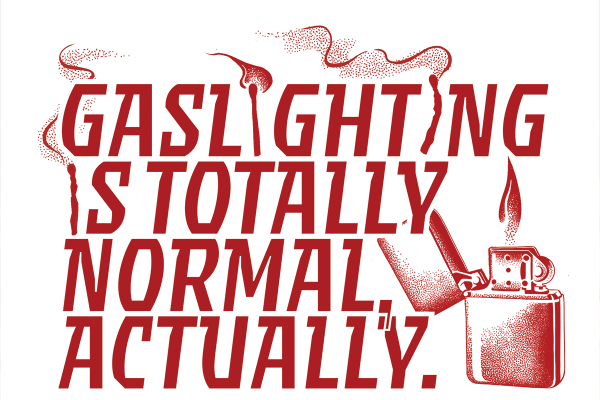Gaslighting is totally normal, and I can’t believe you didn’t know that. Assuming you’re a loyal Critic reader, I’m sure you know all about gaslighting by now. We can’t seem to publish an issue without mentioning the word, and we even ran a feature earlier this year wholly dedicated to it. It had its merits and was definitely memorable, but I hated to see such a benign and commonplace topic demonised in this manner, which is why I felt motivated to write a response. Generally speaking, students are a pretty well-educated population, so you’ll trust me when I say this: Gaslighting is normal. Duh.
Gaslighting is so normal, in fact, that it was Merriam-Webster’s word of 2022. I won’t patronise you by defining it, since you really should know what it means by now. Okay, well, to spare you the embarrassment of messing it up in front of your friends like you always seem to, gaslighting is persistent deception for one’s own gain, usually characterised by causing the “victim” to question their memories, perception, or even sanity.
That’s where my issues with the prior Critic article come in – it characterised a lot of manipulation as gaslighting when it was just that: manipulation. Manipulation is extraordinarily commonplace – a lot of normal social etiquette involves manipulation. When you want the last slice of cake, how often do you actually say so? Versus being like, “So who wants the last piece?” In older generations it’s even worse: how many times have you watched your mum and aunty do the whole, “Oh, that was delicious but I’m so full, you have it” ritual. Just eat the fucking sponge, Sandra. See what I mean? Good, I figured.
If every day social manipulation is this dance of reading between the lines, then gaslighting is when you leave no space between said lines and blame the other person for not magically getting it. That’s where my main argument against Critic lies, which I’m sure you’ve spotted by now. The Uni isn’t “gaslighting” us – bureaucratic PR jargon is as nonsensical to them as it is to us. If it’s intended to be misinterpreted and you fall into the trap of misinterpretation, then maybe it’s your fault and you should watch where you’re stepping.
Anyway, what’s a little manipulation just between friends? Don’t tell me you’ve never pranked one of the bros, or told the bestie that her outfit is a slay when it’s barely even a flesh wound. In a lot of these cases it’s character-building, and you’re just looking out for them in the long run. For it to be “gaslighting”, some kind of power dynamic must be involved. If you have that much power over your loved ones, or they have that much power over you, then maybe you should reconsider your relationships. You should take a long, hard look at your friends anyway. Maybe you spend too much time with them – it really can’t be good for you. You’re in therapy, right?
Gaslighting is not only normal, it’s normalised. Like a lot of terms adopted into pop psychology and colloquial language, the meaning of the word has become desaturated over time. The word’s origin is the 1940 film noir Gaslight, which details an elaborate murder cover-up. The perpetrator convinces his new wife that she’s high-strung and hysterical as she “imagines” seeing the gas lamps flicker downstairs, when really the dancing flames are a result of him sneaking into the house while searching for his previous victim’s possessions. No one believes her, and it gets to the point where she’s almost institutionalised. This intentional and systematic pattern of abuse, the very questioning of one’s sanity, is almost unrecognisable from the way we use the word “gaslight” today. In reality, the things we currently refer to as “gaslighting” are relatively harmless, commonplace, and easily avoidable. If you’re reading this, you’ve probably been studying for a while, and have a good amount of media literacy. Basically, you should know better than to misappropriate the word, and you should know better than to fall for the method.
True gaslighting involves a longform pattern of abusing trust, for predetermined benefit for a party with power or status. Admittedly, this trust can be minor, like a media source you generally like, and the benefit can be as simple as shitposting for pay. Gaslighting can make you question your sanity and even plant false memories – say, for example, writing a response to an article that never existed.
Trust no one. Question everything. And remember: gaslighting sucks, and I can’t believe I almost made you think otherwise. This must be so embarrassing for you.






